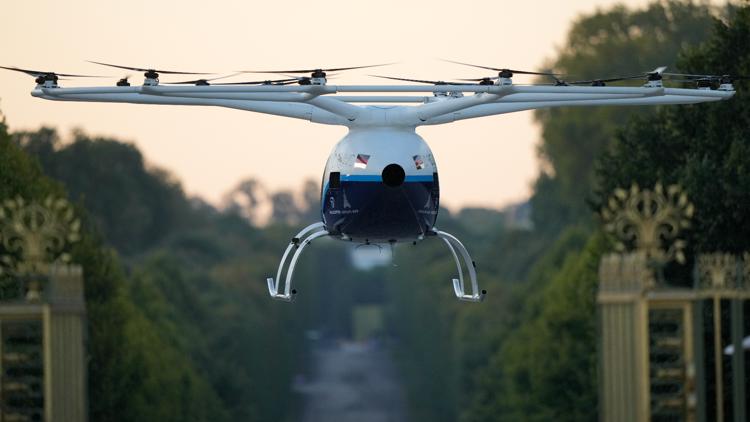Flying through the air in a helicopter taxi to the next Olympic event sounds like something out of sci-fi. But it could be a reality for the 2028 Games in L.A.


VERSAILLES, France — It was a tantalizing vision: autonomous flying taxis zipping spectators around the Paris Olympics, their electric engines humming softly over the cityscape, ushering in a new era in public transport.
Certification delays dashed that dream. But the backers of the Volocopter aircraft that was meant to ferry Olympic fans aren’t giving up. They carried out a test flight Sunday, marking the last day of the 2024 Olympics with a sunrise demonstration over the resplendent grounds of the Versailles palace.
The craft carried baggage, but no people, when it took off from the gardens of Versailles, from where the first hot-air balloon took flight in 1783.
The Paris region had planned for a small fleet of pilot-less air taxis for the Olympics, operated by Germany’s Volocopter and the Paris airport authority ADP.
Five Olympic routes were planned, including one landing on a platform on the Seine River -- and Volocopter CEO Dirk Hoke hoped that French President Emmanuel Macron would be his first passenger.
But ADP’s CEO Augustin de Romanet said Thursday that it had failed to win certification from Europe’s air safety agency in time for the Games.
Manufacturers of electric vertical takeoff and landing aircraft — or eVTOL – remain confident that they’re a wave of the future. Companies around the world are trying to get their models authorized for flight.
Volocopter now hopes to get permission to carry passengers over Paris for the city’s next major event: the reopening of fire-ravaged Notre Dame Cathedral in December.
And rivals are aiming to make the vision of Olympic spectators hopping around venues in autonomous flying machines a reality the next Summer Games — in Los Angeles in 2028.
___
Angela Charlton in Paris contributed.
.png)









 English (US) ·
English (US) ·